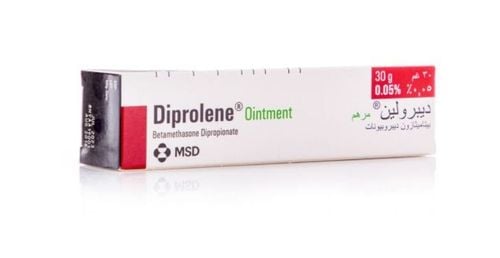This is an automatically translated article.
Cedetamine is used in the treatment of complicated cases in the respiratory tract, allergies in the eyes and skin, inflammatory eye disorders, rhinitis, ... So what does Cedetamine do?
1. What are the effects of Cedetamine?
What is Cedetamine? Cedetamine contains the active ingredients betamethasone and dexlorpheniramine. In particular, betamethasone is a synthetic corticosteroid with anti-inflammatory, anti-allergic and anti-rheumatic effects. Dexchlorpheniramine is an antihistamine with the effect of relieving the symptoms of sneezing, itching, watery eyes, runny nose, and allergic urticaria. Therefore, the drug Cedetamine is effective in the treatment of some cases of acute or chronic allergies such as:
Respiratory allergies Atopic dermatitis Eye inflammation Bronchitis Rhinitis In addition to the above uses, the drug Cedetamine 0 25mg may also be used to treat some other conditions that are not listed above. Therefore, before using the drug, consult your doctor for advice and effective use of the drug.
2. How to use Cedetamine
Cedetamine is made in the form of tablets, so it can be used on an empty stomach or on an empty stomach. It is best to take the drug after a meal to reduce the risk of unwanted effects on the gastrointestinal tract. Take the medicine with a full glass of water to avoid stomach irritation. Dosage of Cedetamine 0 25mg will depend on the patient's medical condition and age such as:
Cedetamine for children from 6 to 12 years old is used at a dose of 1 tablet / time, taken 2 times a day. For children over 12 years old and adults, the usual dose is 1 tablet, 4 times a day. In some cases, it is necessary to adjust the dose to suit the course of the disease and the individual response capacity of each patient.
3. Undesirable effects when using Cedetamine
Some unwanted effects that may occur when using Cedetamine 0 25mg include:
Loss of potassium, water retention and salt retention Irregular menstruation Development of cushing syndrome Inhibition of fetal growth in utero supply and young children Decreased glucose tolerance Reveal latent diabetes mellitus and increase the need for insulin or hypoglycemic agents in patients with diabetes. Muscle weakness, loss of muscle mass Osteoporosis Skin and subcutaneous atrophy Aseptic abscess Refreshing or depression, mood swings, insomnia Cataracts, glaucoma Stomach ulcers and can lead to perforation or bleeding Previous When prescribing medication, doctors always weigh the benefits and effectiveness of Cedetamine more than the risk of side effects. However, some cases when taking Cedetamine may still occur unwanted effects. In this case, the patient should immediately notify the medical staff for immediate intervention.
4. Some notes when using Cedetamine
Some notes when using Cedetamine include:
Inform your doctor about a history of allergy to Cedetamine 0 25mg or any other allergies. Cedetamine may contain inactive ingredients and could cause an allergic reaction or other serious problems. Contraindicated in patients with corneal herpes, active peptic ulcer disease, neonates and premature infants, systemic fungal infections, bacterial or viral infections, patients with diabetes mellitus, psychiatric disorders, glaucoma closed angle or people at risk of urinary retention related to prostatic urethral disorders, angle-closure glaucoma. Betamethasone may reverse some signs of infection and there is a possibility of superinfection during treatment. Limit corticosteroid therapy to patients with active tuberculosis. Cedetamine should be used with caution in patients with narrow-angle glaucoma, renal failure, liver failure, pyloric obstruction, cardiovascular disease such as congestive heart failure, hypertension, recent myocardial infarction, and obesity. enlarged prostate, increased intraocular pressure, or hyperthyroidism. Prolonged use of corticosteroids can lead to cataracts, especially in children, and glaucoma with the risk of damage to the optic nerve. Therefore, it is necessary to monitor the patient if long-term corticosteroid therapy is used. The risk of chickenpox, or possibly severe herpes zoster infection, is often increased in immunocompromised patients to systemic corticosteroids. Therefore, patients need to avoid exposure to these pathogens or need to be passively immunized. Cedetamine has a sedative effect, so it causes drowsiness, not suitable for driving or operating machinery. For pregnant women, Cedetamine should only be used when the benefit of treatment has been weighed against the risk of harm to the mother as well as the development of the fetus. Newborns should be carefully monitored for signs of adrenal insufficiency after birth if the mother has used multiple doses of corticosteroids during pregnancy. Breastfeeding women should stop breastfeeding during treatment.
5. Drug interactions
Some drugs can interact with Cedetamine such as:
Phenobarbital Phenytoin Rifampicin Glycoside tom Potassium-depleting diuretics Coumarin anticoagulants Tricyclic antidepressants or monoamine oxidase inhibitors Central nervous system depressants Cedetamine medicine at room temperature not exceeding 30°C, protect from light and avoid humid places. Do not store Cedetamine in a humid place or in the freezer. Different medicines will have different storage methods, so read the instructions for storing Cedetamine on the package carefully, or ask your pharmacist. Keep Cedetamine out of the reach of children and family pets. When the medicine has been damaged and cannot be used anymore or has expired, dispose of the medicine according to the correct procedure.
Please dial HOTLINE for more information or register for an appointment HERE. Download MyVinmec app to make appointments faster and to manage your bookings easily.













